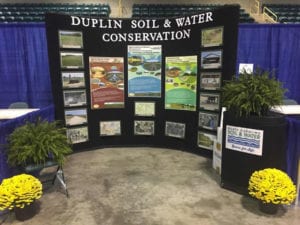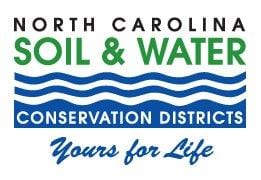Soil and Water Conservation
Purpose:
The purpose of the Duplin District is to control erosion and improve water quality and to take available technical, financial and educational resources, and focus on coordinating them so that they meet the needs of the local agricultural land users. Our work targets conservation of soil, water, and related natural resources on working land- the land used to produce food, fiber, and other services that improve the quality of life people experience in rural and urban communities. We work to discover, develop, implement, and constantly improve ways to use land that sustains its productive capacity and enhances the environment at the same time.
General Services:
We provide technical and financial assistance to landowners of agricultural lands to implement best management practices on their farm. We assist in creating waste management plans, conservation plans and nutrient management plans. We oversee maintenance on the Limestone and Muddy Creek Watershed Projects and coordinate stream debris removal projects on various creeks in the county. We offer educational materials for local schools and provide resources for students to participate in educational programs such as the 6th grade poster contest, Resource Conservation Workshop, and a youth fishing tournament just to name a few.
Cost Share Programs

WHAT?
The major cause of water quality problems in North Carolina, and in much of the United States, is nonpoint source pollution. In many places, damage to our water resources comes from soil erosion, excessive fertilizer use, animal waste contamination, and improper use of agricultural chemicals. The NC Ag Cost Share Program helps address nonpoint pollution by providing technical and financial resources.
WHO?
If you are a landowner or renter of an existing agricultural operation that has been operating for more than three years, you are eligible to participate in this program.
WHERE?
Submit an application to your local Soil and Water Conservation District. The applications are ranked based on resource concerns identified in the county. Applicants can be reimbursed up to 75 percent of a predetermined average cost for each best management practice installed. The applicant is responsible for 25% of the costs. This may include the use of existing material and labor.
History of Soil and Water:
On May 12, 1934, the worst dust storm in the nation’s history swept eastward from the Great Plains to the Atlantic Ocean, obscuring the sun and depositing obvious films of dust as it moved. This catastrophic storm served as the catalyst for public outcry and congressional action for soil and water conservation throughout the nation. The first soil conservation district in the United States was organized on August 4, 1937, in Anson County North Carolina by Hugh Hammond Bennett (sometimes called the father of the conservation movement).
Soil and Water Conservation Districts were authorized under North Carolina General Statute 139 and adopted in 1937. Districts are created locally and organized to plan and carry out a comprehensive conservation program for the local citizens. District affairs are managed by the local District Board of Supervisors: three elected and two appointed citizens from different areas of the county. This allows for governmental assistance in conservation programs to remain under local control.
Staff:
Billy Ivey, Soil Conservation Tech, billy.ivey@duplincountync.com
David Whaley, Soil Conservation Tech, david.whaley@duplincountync.com
Cole Smith, Soil Conservation Tech, cole.smith2@usda.gov
Vickie Baker, Soil Conservation Tech, vickie.baker@nc.nacdnet.net
Kristy Dail, Administrative Specialist, kristy.dail@usda.gov







